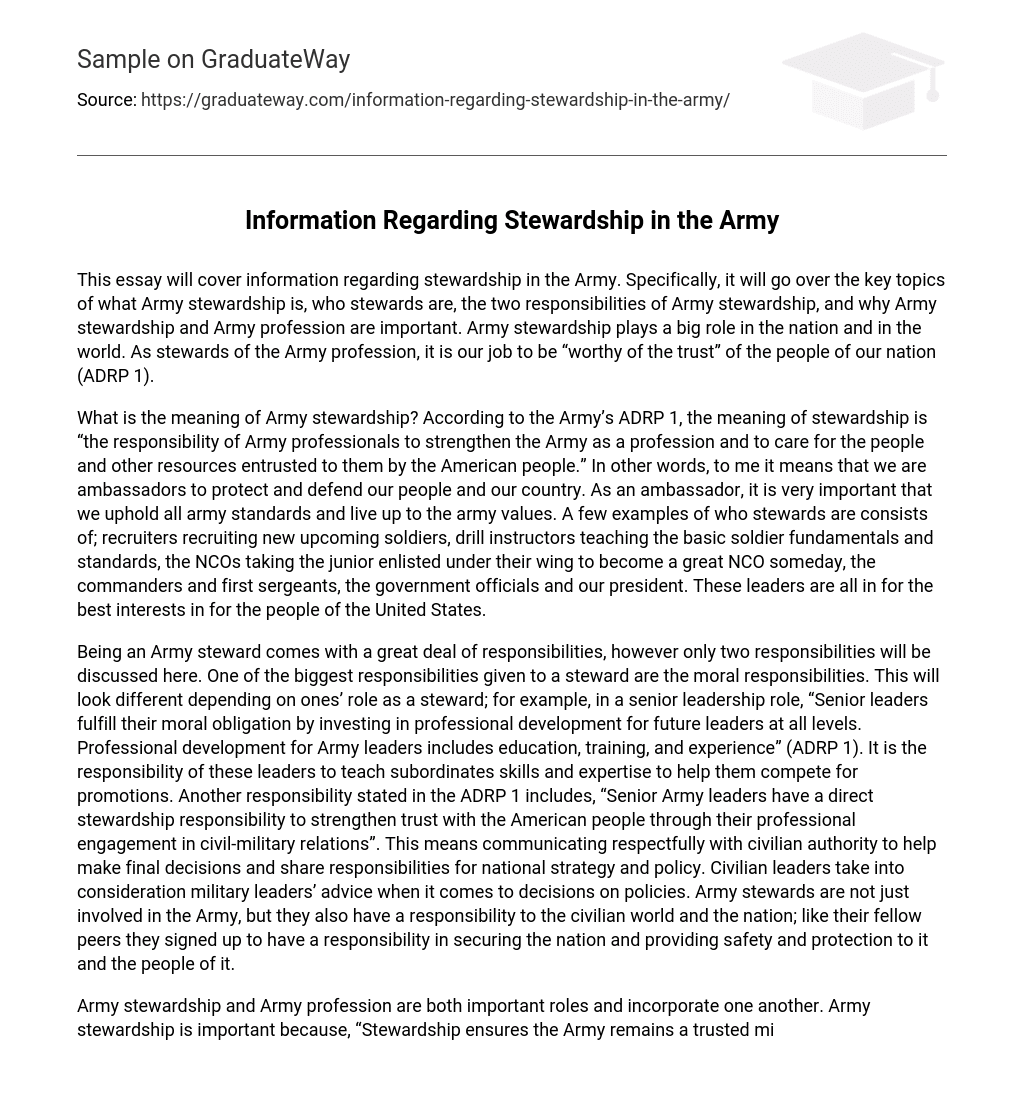This essay will cover information regarding stewardship in the Army. Specifically, it will go over the key topics of what Army stewardship is, who stewards are, the two responsibilities of Army stewardship, and why Army stewardship and Army profession are important. Army stewardship plays a big role in the nation and in the world. As stewards of the Army profession, it is our job to be “worthy of the trust” of the people of our nation (ADRP 1).
What is the meaning of Army stewardship? According to the Army’s ADRP 1, the meaning of stewardship is “the responsibility of Army professionals to strengthen the Army as a profession and to care for the people and other resources entrusted to them by the American people.” In other words, to me it means that we are ambassadors to protect and defend our people and our country. As an ambassador, it is very important that we uphold all army standards and live up to the army values. A few examples of who stewards are consists of; recruiters recruiting new upcoming soldiers, drill instructors teaching the basic soldier fundamentals and standards, the NCOs taking the junior enlisted under their wing to become a great NCO someday, the commanders and first sergeants, the government officials and our president. These leaders are all in for the best interests in for the people of the United States.
Being an Army steward comes with a great deal of responsibilities, however only two responsibilities will be discussed here. One of the biggest responsibilities given to a steward are the moral responsibilities. This will look different depending on ones’ role as a steward; for example, in a senior leadership role, “Senior leaders fulfill their moral obligation by investing in professional development for future leaders at all levels. Professional development for Army leaders includes education, training, and experience” (ADRP 1). It is the responsibility of these leaders to teach subordinates skills and expertise to help them compete for promotions. Another responsibility stated in the ADRP 1 includes, “Senior Army leaders have a direct stewardship responsibility to strengthen trust with the American people through their professional engagement in civil-military relations”. This means communicating respectfully with civilian authority to help make final decisions and share responsibilities for national strategy and policy. Civilian leaders take into consideration military leaders’ advice when it comes to decisions on policies. Army stewards are not just involved in the Army, but they also have a responsibility to the civilian world and the nation; like their fellow peers they signed up to have a responsibility in securing the nation and providing safety and protection to it and the people of it.
Army stewardship and Army profession are both important roles and incorporate one another. Army stewardship is important because, “Stewardship ensures the Army remains a trusted military profession, both today and tomorrow” (U.S. Army Training and Doctrine Command). Stewardship is an essential aspect of the army profession, stewardship reflects a professional responsibility to the Army and to the nation. Army profession is the duties that come with being enlisted in the army and the job itself. “The Army Profession is one of the most trusted institutions in the country. Trust between the public and Army rests on the Army maintaining a culture informed by the ethic and values.” (U.S. Army Training and Doctrine Command). The Army profession is what leads this country into war, and protects the citizens of this country. Without the Army profession the nation would more than likely be under another form of government, as there wouldn’t be anyone to fight the wars for the nation.





